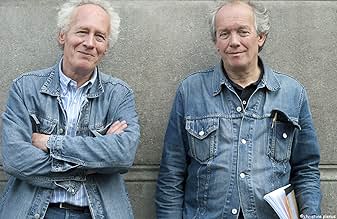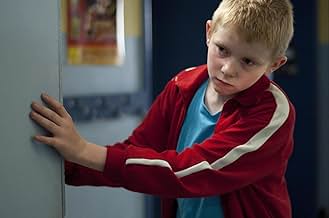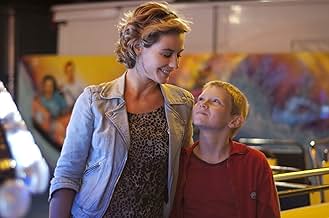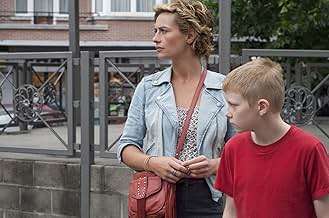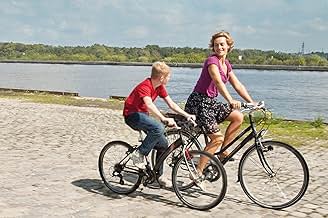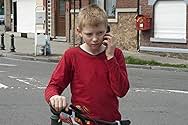AVALIAÇÃO DA IMDb
7,4/10
29 mil
SUA AVALIAÇÃO
Abandonado pelo pai, um menino é deixado em uma fazenda para jovens administrada pelo Estado. Em um ato de gentileza, a cabeleireira da cidade concorda em adotá-lo nos fins de semana.Abandonado pelo pai, um menino é deixado em uma fazenda para jovens administrada pelo Estado. Em um ato de gentileza, a cabeleireira da cidade concorda em adotá-lo nos fins de semana.Abandonado pelo pai, um menino é deixado em uma fazenda para jovens administrada pelo Estado. Em um ato de gentileza, a cabeleireira da cidade concorda em adotá-lo nos fins de semana.
- Direção
- Roteiristas
- Artistas
- Prêmios
- 9 vitórias e 31 indicações no total
Cécile de France
- Samantha
- (as Cécile De France)
Samuel De Ryck
- Éducateur 2
- (as Samuel De Rijk)
- Direção
- Roteiristas
- Elenco e equipe completos
- Produção, bilheteria e muito mais no IMDbPro
Avaliações em destaque
I recently saw this at the 2012 Palm Springs International Film Festival. This was Belgium's official submission to the Academy Awards for Best Foreign Language Film and won the Grand Prix as the Jury Prize winner at the Cannes film Festival. Cyril Catoul (Thomas Doret) is living in a state run home and school for children after his single parent father Guy Catoul (Jérémie Renier) abandoned him. Cyril's father promised him that he wouldn't sell his beloved bike and when the father never returns to take him from the state care he sets out in search of his father and his bike. A kind single woman, Samantha, (Cécile De France) takes pity on him and tracks down the bicycle that his father had sold and buys it and returns it to Cyril. Samantha soon takes Cyril in to live with her part-time. Cyril is a very troubled young boy and is longing to belong and have a family. He has a temper and is a candidate for a troubled life. From writers/directors/producers the Dardenne brothers, this is a good story with fine acting. I'm sure for the role of Cyril, the directors instructed first time actor Doret, to act like a brat and be who he isn't. It worked well. De France is great as the strong and sympathetic Samantha. The story moves along well with a good score and nice editing. It's a little implausible at times and kind of far-fetched but it's a crowd pleaser and I would give it an 8.0 and recommend it.
This film takes place in Europe (Belgium, apparently) so it has far less of the violence that would accompany the same story set in America. But otherwise the story is particularly painful to watch because the essential elements - a kid without a father, his self-hate and anger, the substitute father figures laying in wait - are directly relevant to the American context. In a lean, tough story, the film takes us through a broad tour of the issues and risks and even reasons for hope in these situations. Young Thomas Doret fiercely embodies the aching and the rage of a boy who wants a father at any price and is a near-force of nature in trying to obtain what should be his by right. Cécile De France's Samantha has numerous real-life counter-parts, credited by more than one survivor of these dilemmas, but not always successful in their roles as passionate rescuers. How this particular story turns out is not so important as the realization that all across the world children live in Cyril's situation; some make it, many don't.
Greetings again from the darkness. When Guy (Jeremie Renier) states that he can't take care of his son Cyril (Thomas Douret) right now, I felt a rush of anger and disgust. Imagine if you were his 11 year old son hearing those words. Young kids should be able to count on their parents for emotional security above all else. There should be no fear of abandonment ... those are issues no child should be forced to deal with (barring a natural disaster).
The Belgium writer/director team of brothers Jean-Pierre and Luc Dardenne have a history of taking on parenthood and childhood in a head-on manner. Cyril is dumped in an orphanage by his dad, and is convinced that he is just misplaced, not abandoned. So being the fiercely determined kid he is, he re-traces his steps from coffee shops to bars to their old apartment. Cyril is convinced his dad never would have sold his treasured bicycle, no matter how desperate for money he was.
Whatever confusion and hostility that you think Cyril might experience, once he confronts his dad, the filmmakers display it in the rawest possible form. Cyril is a symbol of need, hiding behind a wall of rebellion. A chance encounter with Samantha (Cecile de France) leads to weekend visitations and the start of an awkward quasi-family life for both of them. Cyril tests Samantha and all other authority figures in every possible manner, often to the breaking point.
As a parent, it's easy to spot the vulnerabilities that a child faces before they have the maturity to handle it. We see how easily Cyril falls in with the wrong crowd and how quickly things can get really bad. Luckily for Cyril, Samantha doesn't abandon him. She answers "I don't know" to his question of why she let him stay with her. Although, the filmmakers never let us in on her deepest thoughts, we suspect she was once not all so different than Cyril, and someone stepped up for her.
This film won the Grand Jury Prize at Cannes in 2011 and it's easy to see how. It shows how difficult and messy ordinary life can be, but how often things turn out OK, though rarely perfect. Film lovers will recognize Cecile de France from her many films, including the recent Hereafter and the excellent Mesrine.
The Belgium writer/director team of brothers Jean-Pierre and Luc Dardenne have a history of taking on parenthood and childhood in a head-on manner. Cyril is dumped in an orphanage by his dad, and is convinced that he is just misplaced, not abandoned. So being the fiercely determined kid he is, he re-traces his steps from coffee shops to bars to their old apartment. Cyril is convinced his dad never would have sold his treasured bicycle, no matter how desperate for money he was.
Whatever confusion and hostility that you think Cyril might experience, once he confronts his dad, the filmmakers display it in the rawest possible form. Cyril is a symbol of need, hiding behind a wall of rebellion. A chance encounter with Samantha (Cecile de France) leads to weekend visitations and the start of an awkward quasi-family life for both of them. Cyril tests Samantha and all other authority figures in every possible manner, often to the breaking point.
As a parent, it's easy to spot the vulnerabilities that a child faces before they have the maturity to handle it. We see how easily Cyril falls in with the wrong crowd and how quickly things can get really bad. Luckily for Cyril, Samantha doesn't abandon him. She answers "I don't know" to his question of why she let him stay with her. Although, the filmmakers never let us in on her deepest thoughts, we suspect she was once not all so different than Cyril, and someone stepped up for her.
This film won the Grand Jury Prize at Cannes in 2011 and it's easy to see how. It shows how difficult and messy ordinary life can be, but how often things turn out OK, though rarely perfect. Film lovers will recognize Cecile de France from her many films, including the recent Hereafter and the excellent Mesrine.
without any introductions, the film gets down to the story. a kid on the phone is all but accepting to hear that the number he dialed is out of service. a precisely fluid social humanist film about a 11 year old kid and his relentless quests to go all the way to, against everybody's wishes, find a parent that wants nothing to do with him. basing his stance on the argument that his father would never leave without leaving him his bike.
once retrieved, the bike serves as the catalyst that allows the kid to advance, more in a figurative sense; we see him fight and bite for it. the last relic of a family life to him.
the kid in red is a lot of things: determined with rage and astounding obstinacy, always on the move, has nothing to lose so he goes to the limits. at one point, he nervously plays with a faucet as to not lose face in front of such injustice. but in his misfortune, Samantha, an adult portraying a kind stranger and genuine goodness, generosity and warmth, takes care of him. being emotionally distant, the kid rejects her at first and goes on exploring until he finally finds himself in his most despairing moment.. the kid remains a very interesting character to me, he is easy to deceive, capable of violence, but only because he is affectionate at heart and more honest than the people he deals with. which resonates with me as the film is able to kindle bits of memories of the audience.
once retrieved, the bike serves as the catalyst that allows the kid to advance, more in a figurative sense; we see him fight and bite for it. the last relic of a family life to him.
the kid in red is a lot of things: determined with rage and astounding obstinacy, always on the move, has nothing to lose so he goes to the limits. at one point, he nervously plays with a faucet as to not lose face in front of such injustice. but in his misfortune, Samantha, an adult portraying a kind stranger and genuine goodness, generosity and warmth, takes care of him. being emotionally distant, the kid rejects her at first and goes on exploring until he finally finds himself in his most despairing moment.. the kid remains a very interesting character to me, he is easy to deceive, capable of violence, but only because he is affectionate at heart and more honest than the people he deals with. which resonates with me as the film is able to kindle bits of memories of the audience.
"Not everyone can be an orphan." Andre Gide
A kid with only a bike and no mother or active father---now that's a setup for sentiment. Yet the Dardenne brothers have fashioned an unsentimental, realistic drama, The Kid with a Bike, about an 11 year old boy, Cyril (Thomas Doret), who is fortunately taken in by a guardian, town hairdresser Samantha (Cecile De France), but not without serious setbacks that are understandable given his unstable background.
The title evokes thoughts of the famous Italian neo-realist Bicycle Thief, in which a young boy is introduced to life's hard knocks through an imperfect father. In Kid, the father is a deadbeat deserter whose brief appearances are depressing because it's clear a reconnection with his son is not going to happen.
Cyril is running through most of the film, either by bike or foot, a motif signifying his desperate desire for a parent. However blood does not have to be in the loving equation as Samantha becomes a willing surrogate.
No surprise The Boy with the Bike won the Grand Jury Prize at Cannes (2011) and the directors several times before in multiple categories. The humanity rather than the technicality dominates the emotionality; the two principal actors, Doret and De France, are incomparably natural and convincing. Make no mistake, this is a film about a boy, whose character arc the directors fully present. Whether or not he ends up for good through all the turmoil is the pleasure of watching this soon-to-be classic.
You may think again about leaving your child with only his bicycle.
A kid with only a bike and no mother or active father---now that's a setup for sentiment. Yet the Dardenne brothers have fashioned an unsentimental, realistic drama, The Kid with a Bike, about an 11 year old boy, Cyril (Thomas Doret), who is fortunately taken in by a guardian, town hairdresser Samantha (Cecile De France), but not without serious setbacks that are understandable given his unstable background.
The title evokes thoughts of the famous Italian neo-realist Bicycle Thief, in which a young boy is introduced to life's hard knocks through an imperfect father. In Kid, the father is a deadbeat deserter whose brief appearances are depressing because it's clear a reconnection with his son is not going to happen.
Cyril is running through most of the film, either by bike or foot, a motif signifying his desperate desire for a parent. However blood does not have to be in the loving equation as Samantha becomes a willing surrogate.
No surprise The Boy with the Bike won the Grand Jury Prize at Cannes (2011) and the directors several times before in multiple categories. The humanity rather than the technicality dominates the emotionality; the two principal actors, Doret and De France, are incomparably natural and convincing. Make no mistake, this is a film about a boy, whose character arc the directors fully present. Whether or not he ends up for good through all the turmoil is the pleasure of watching this soon-to-be classic.
You may think again about leaving your child with only his bicycle.
Você sabia?
- CuriosidadesFor both the moments where Cyril is running from the police and ends up in the doctor's office and the opening scene when he's using the phone and won't let go, the young actor was just instructed by the directors not to give up what the character was doing under any circumstance.
- Erros de gravaçãoWhen the hairdresser is leaving the orphanage after she returned Cyrill's bike the car she is driving makes the sound of Diesel engine, but in the next scene with the same car the car sounds like it has a petrol engine.
- Citações
Guy Catoul: It's too much. I can't look after him.
- ConexõesFeatured in At the Movies: Cannes Film Festival 2011 (2011)
- Trilhas sonorasAdagio un poco mosso
from Piano Concerto No. 5, Op. 73
written by Ludwig van Beethoven
performed by Alfred Brendel and the London Philharmonic Orchestra
conducted by Bernard Haitink
Principais escolhas
Faça login para avaliar e ver a lista de recomendações personalizadas
- How long is The Kid with a Bike?Fornecido pela Alexa
Detalhes
- Data de lançamento
- Países de origem
- Centrais de atendimento oficiais
- Idioma
- Também conhecido como
- The Kid with a Bike
- Locações de filme
- Empresas de produção
- Consulte mais créditos da empresa na IMDbPro
Bilheteria
- Faturamento bruto nos EUA e Canadá
- US$ 1.470.000
- Fim de semana de estreia nos EUA e Canadá
- US$ 45.933
- 18 de mar. de 2012
- Faturamento bruto mundial
- US$ 7.182.147
- Tempo de duração1 hora 27 minutos
- Cor
- Mixagem de som
- Proporção
- 1.85 : 1
Contribua para esta página
Sugerir uma alteração ou adicionar conteúdo ausente

Principal brecha
What is the Japanese language plot outline for O Garoto da Bicicleta (2011)?
Responda

